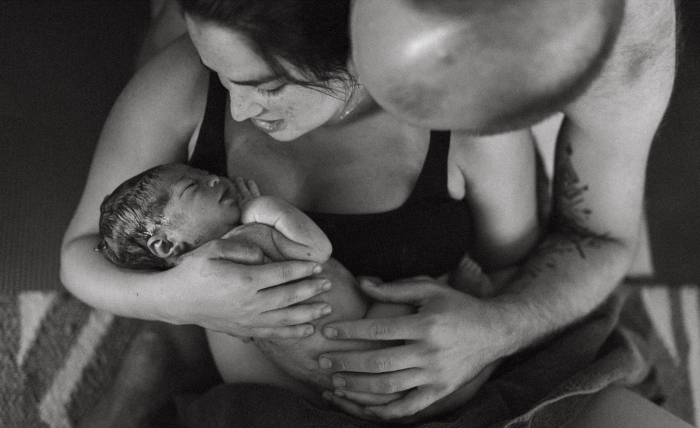What Is A Midwife? And How To Have A Peaceful Birth

When I talk about my birth story, I get asked how I was able to feel confident for a home birth as a first time mom. I, myself, was a home birth baby. My mom chose to have a home birth with me after a traumatic c-section with her first baby.
Most women that choose home births do so after a traumatic hospital birth experience, like my mom. Me - well, you could say I was born into the world of home births.
I was lucky. But birth trauma is very real and very widespread. In the US, 1 in 3 babies are born via c-section. Many of these leave mamas with birth trauma.
That's why your birth team matters. And where you choose to give birth matters.
So let's talk about home birth and get into some of the most common questions I get: what is a midwife? what does a midwife do? and what is the difference between a midwife vs OBGYN?
What is a Midwife?
Midwives are experts in natural birth. Their training specializes in supporting women through pregnancy, birth and postpartum. They focus on providing individualized care, education, resources and support.
Midwives often adopt a holistic approach. They emphasize physical, emotional, and mental wellness.
What Does a Midwife Do?
Midwives offer a range of services that cover the full spectrum of maternity care. Their care is usually tailored for home births. Here are some of the key responsibilities of a midwife:
Prenatal Care. Midwives conduct regular prenatal visits. They keep track of your baby's growth. They provide nutritional and lifestyle advice for a healthy pregnancy. They are also a great resource. They can connect you to prenatal massage therapists, acupuncturists, and other trusted specialists.
Labor and Delivery Support. During labor, midwives offer continuous support. Depending on what each mama needs, they provide guidance to smooth the path for a natural home birth. They are skilled in handling deliveries at home. They also have the skills to recognize when medical intervention is necessary.
Newborn Assessment. Once your baby is born, after the golden hour of mama and baby bonding, midwives will perform the newborn exam.
Postpartum Care. Midwives continue to support new mothers for weeks. They offer breastfeeding advice, newborn care guidance, and track mama's recovery. The best part: they come to you. This is all within the comfort of your own home.
Midwife vs OBGYN: Which is Right For You?
Education & Training
Midwife. A midwife can be a Certified Nurse-Midwife (CNMs) or Certified Professional Midwife (CPMs). CNMs have nursing degrees and advanced training in midwifery. CPMs are specifically trained in midwifery. All midwives train to understand physiological birth.
OBGYN. OBGYNs are doctors with specialized training in obstetrics and gynecology. They train to be skilled in medical interventions and surgeries, including c-sections.
Approach to Care
Midwife. Midwives take a holistic and individualized approach, focusing on low-intervention births. They are great for mothers who prefer a natural, unmedicated birth.
OBGYN. OBGYNs can provide a full range of medical treatments and interventions, including epidurals, Pitocin and more.
Birth Environment
Midwife. Often works in various settings, including home births, birth centers, and hospitals.
OBGYN. Primarily operates within hospital settings.
The Benefits of Choosing A Midwife
Know Who Will Be With You For Your Birth. Through prenatal care, you develop a relationship with your midwife. This allows you to feel safe and comfortable when you're in labor. In a hospital, if your OBGYN is not on call, whoever is on call will deliver your baby, even if you don't know them.
Lower Intervention Rates. Midwife-led births tend to have lower rates of c-sections and medical interventions. Midwives are equipped to handle common non-emergency concerns without turning to medical interventions.
Individualized Care. Midwives often provide more one-on-one time and personalized attention. You won't feel like just another patient.
Holistic Approach. Midwives often incorporate natural and holistic practices into their care. They focus on the overall well-being of the mama and baby, including mental and emotional wellness, not just the physical.
Postpartum Care Right At Home. Most midwives will come to your home for postpartum check ups. They understand the newborn stage is hard enough. So they don't make you leave your home for your postpartum care.
My midwife giving my mom the honor of weighing my baby during a home visit in the same living room where she was born.
How Do I Find A Midwife Near Me?
Ask Your Community. Start by asking for recommendations from friends, family or your healthcare provider. The best references come from people you know and trust.
Ask A BBTW Doula Near You. Birth Belongs to Women doulas work with trusted midwives across the US and Europe.
Birth Centers. Reach out to birth centers near you and ask for recommendations.
Interviews & Consultations. Feel free to schedule consultations with various midwives. Ask about their philosophy, experience, services, hospital transfer rates and more. Ask what would happen if your baby is breech and what they would do if you go past your due date. Ask everything you need to know to gauge if they are a good fit for your birth plan.
This is YOUR Birth, Mama
Take the time to ask questions and get informed. Understanding what is a midwife and how to choose the right one for you is key to having the best birth possible.
After all, the birth of your baby is your birth, too. And a peaceful birth is what you both deserve.
*This content is for informational purposes only and is not medical advice.


